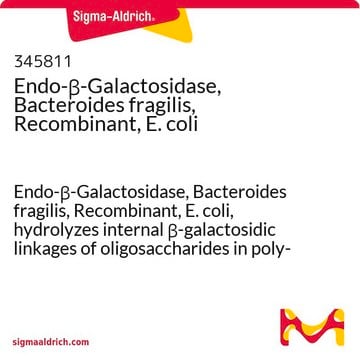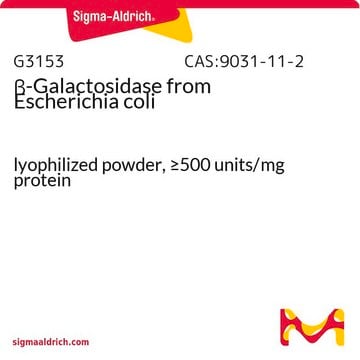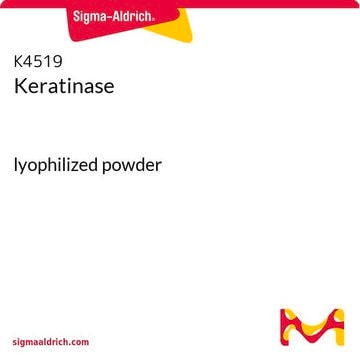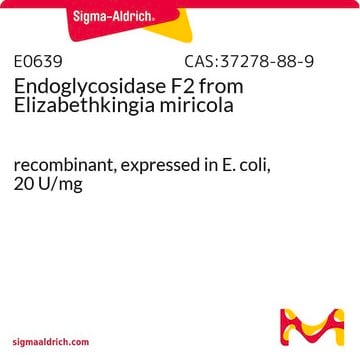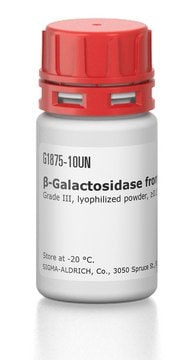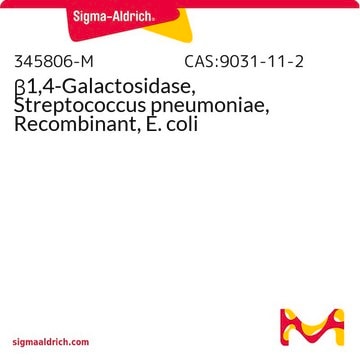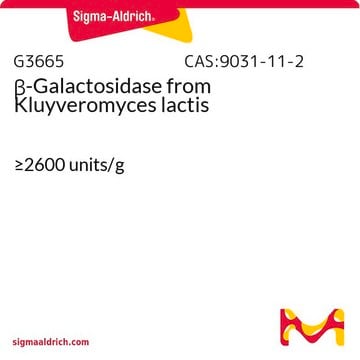G6920
Endo-β-galactosidase from Bacteroides fragilis
recombinant, expressed in E. coli, ≥140 units/mg protein, buffered aqueous solution
Synonyme(s) :
β-Galactosidase bacterial, Keratanase
About This Item
Produits recommandés
Produit recombinant
expressed in E. coli
Niveau de qualité
Conjugué
(Glucosaminoglycan)
Stérilité
aseptically filled
Forme
buffered aqueous solution
Activité spécifique
≥140 units/mg protein
Poids mol.
32 kDa
Température de stockage
2-8°C
Catégories apparentées
Application
Actions biochimiques/physiologiques
Sulfated structures such as keratan sulfate are also cleaved. Branching and/or fucosylation of the substrate may reduce or completely inhibit cleavage. Sulfation of C-6 on galactose will block cleavage. Oligosaccharides of the neolacto-group are cleaved at greatly reduced rates depending on the deviation from the preferred substrate. For example, Gal β(1-3)GlcNAc β(1-3) Gal β(1-4)Glc is cleaved at 5X10-5 the rate of keratan sulfate
β-galactosidase cleaves lactose into its monosaccharide components, glucose and galactose. It also catalyses the transglycosylation of glucose into allolactose, the inducer of β-galactosidase, in a feedback loop.
Définition de l'unité
Forme physique
Code de la classe de stockage
10 - Combustible liquids
Classe de danger pour l'eau (WGK)
WGK 1
Point d'éclair (°F)
Not applicable
Point d'éclair (°C)
Not applicable
Équipement de protection individuelle
Eyeshields, Gloves, multi-purpose combination respirator cartridge (US)
Certificats d'analyse (COA)
Recherchez un Certificats d'analyse (COA) en saisissant le numéro de lot du produit. Les numéros de lot figurent sur l'étiquette du produit après les mots "Lot" ou "Batch".
Déjà en possession de ce produit ?
Retrouvez la documentation relative aux produits que vous avez récemment achetés dans la Bibliothèque de documents.
Les clients ont également consulté
Articles
Explore strategies for releasing N-linked glycans with PNGase F, PNGase A & native & sequential deglycosylation with endoglycosidases & exoglycosidases.
Explore strategies for releasing N-linked glycans with PNGase F, PNGase A & native & sequential deglycosylation with endoglycosidases & exoglycosidases.
Explore strategies for releasing N-linked glycans with PNGase F, PNGase A & native & sequential deglycosylation with endoglycosidases & exoglycosidases.
Explore strategies for releasing N-linked glycans with PNGase F, PNGase A & native & sequential deglycosylation with endoglycosidases & exoglycosidases.
Notre équipe de scientifiques dispose d'une expérience dans tous les secteurs de la recherche, notamment en sciences de la vie, science des matériaux, synthèse chimique, chromatographie, analyse et dans de nombreux autres domaines..
Contacter notre Service technique

